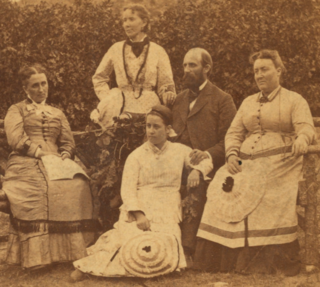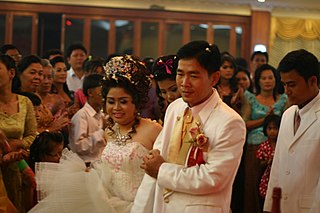Related Research Articles

Marriage, also called matrimony or wedlock, is a culturally and often legally recognised union between people called spouses. It establishes rights and obligations between them, as well as between them and their children, and between them and their in-laws. It is nearly a cultural universal, but the definition of marriage varies between cultures and religions, and over time. Typically, it is an institution in which interpersonal relationships, usually sexual, are acknowledged or sanctioned. In some cultures, marriage is recommended or considered to be compulsory before pursuing sexual activity. A marriage ceremony is called a wedding, while a private marriage is sometimes called an elopement.

Polygyny is a form of polygamy entailing the marriage of a man to several women. The term polygyny is from Neoclassical Greek πολυγυνία (polugunía); from Ancient Greek πολύ (polú) 'many' and γυνή (gunḗ) 'woman, wife'.
Polygamy is the practice of marrying multiple spouses. When a man is married to more than one wife at the same time, it is called polygyny. When a woman is married to more than one husband at the same time, it is called polyandry. In sociobiology and zoology, researchers use polygamy in a broad sense to mean any form of multiple mating.

Polygamy was practiced by leaders of the Church of Jesus Christ of Latter-day Saints for more than half of the 19th century, and practiced publicly from 1852 to 1890 by between 20 and 30 percent of Latter-day Saint families.
Group marriage or conjoint marriage is a marital arrangement where three or more adults enter into sexual, affective, romantic, or otherwise intimate short- or long-term partnerships, and share in any combination of finances, residences, care or kin work. Group marriage is considered a form of polygamy. While academic usage has traditionally treated group marriage as a marital arrangement, more recent usage has expanded the concept to allow for the inclusion of non-conjugal unions. Colloquial usage of group marriage has also been associated with polyamory and polyamorous families.

Nikah halala, also known as tahleel marriage, is a practice in which a woman, after being divorced by her husband by triple talaq, marries another man, consummates the marriage, and gets divorced again in order to be able to remarry her former husband. Nikah means marriage and halala means to make something halal, or permissible. This form of marriage is haram (forbidden) according to the hadith of Islamic prophet Muhammad. Nikah halala is practiced by a small minority of Muslims, mainly in countries that recognise the triple talaq.

Marriage law is the body of legal specifications and requirements and other laws that regulate the initiation, continuation, and validity of marriages, an aspect of family law, that determine the validity of a marriage, and which vary considerably among countries in terms of what can and cannot be legally recognized by the state.
The type, functions, and characteristics of marriage vary from culture to culture, and can change over time. In general there are two types: civil marriage and religious marriage, and typically marriages employ a combination of both. Marriages between people of differing religions are called interfaith marriages, while marital conversion, a more controversial concept than interfaith marriage, refers to the religious conversion of one partner to the other's religion for sake of satisfying a religious requirement.

Traditional Sunni and Shia Islamic marital jurisprudence allows Muslim men to be married to multiple women. Men can have up to four wives at a time according to the islamic jurisprudence.
Polygamy is the practice of having more than one spouse at the same time. Specifically, polygyny is the practice of one man taking more than one wife while polyandry is the practice of one woman taking more than one husband. Polygamy is a common marriage pattern in some parts of the world. In North America, polygamy has not been a culturally normative or legally recognized institution since the continent's colonization by Europeans.

Courtship, marriage, and divorce in Cambodia are important aspects of family life. Customs vary as between rural and urban areas, with many city dwellers being influenced by western ideas. The choice of a spouse is usually undertaken by the families of young men and women, sometimes with the help of a matchmaker. A man usually marries between the ages of nineteen and twenty-five and a woman between sixteen and twenty-two.
Polygamy is "the practice or custom of having more than one wife or husband at the same time." Polygamy has been practiced by many cultures throughout history.

The status and social roles of women in Mali have been formed by the complex interplay of a variety of traditions in ethnic communities, the rise and fall of the great Sahelien states, French colonial rule, independence, urbanisation, and postcolonial conflict and progress. Forming just less than half Mali's population, Malian women have sometimes been the center of matrilineal societies, but have always been crucial to the economic and social structure of this largely rural, agricultural society.
Polygamy in Pakistan is legally permissible, according to the law of 1961, but restricted to Muslim men, who may have a maximum of four wives at one time. However it is illegal for Hindus as per the Hindu marriage law.
Polygamy in Chad is legal and it is commonly practiced. Chad is part of the "polygamy belt", a region in Africa which includes countries in West and Central Africa where polygamy is common and deeply rooted in the culture.
The Republic of Afghanistan, which is an Islamic Republic under Sharia Law, allows for polygyny. Afghan men may take up to four wives, as Islam allows for such. A man must treat all of his wives equally; however, it has been reported that these regulations are rarely followed. While the Qur'an states that a man is allowed a maximum of four wives, there is an unspecified number of women allowed to be his 'concubines'. These women are considered unprotected and need a man as a guardian.
The legal status of polygamy varies widely around the world. Polygamy is legal in 58 out of nearly 200 sovereign states, the vast majority of them being Muslim-majority countries. Some countries that permit polygamy have restrictions, such as requiring the first wife to give her consent.
Polygamy in Thailand could be freely practiced before 1 October 1935. Polygamy was recognised under civil law. The old family law assigned wives to three categories in accordance with how they became wives:
Polygamy in Guinea is generally illegal. Polygamy is regulated under the new 2019 family law. The new regulations stipulate that a marriage is presumed to be monogamous; however a couple may legally enter into a polygynous marriage if the groom declares that he is opting for polygyny during the marriage ceremony and the bride gives "explicit consent". The new law is the result of a long legislative battle between those who wanted free polygamy without restrictions and those who wanted a complete ban.
Polygamy in Africa has existed throughout the history of Africa. Polygamy, particularly polygyny, is a highly valued social institution in Africa. Polygamy is a marriage between a man or woman and their multiple spouses. Polygyny is a marriage between a man and multiple wives. Polyandry is a marriage between a woman and multiple husbands. A common expectation for African kings in African societies is for African kings to symbolically unify his kingdom and the society through partaking in polygamous marriages with wives from a broad range of clans within the society. By doing so, the king reduces the chance of dissident and rival forces developing and rising against him.
References
- ↑ "Refworld | Mali: polygamy, including conditions to be met for a man to be able to marry a second wife; divorce, specifically when a woman requests a divorce, including the grounds and treatment of women by society and the authorities (2012-December 2013)".
- ↑ "Polygamy is rare around the world and mostly confined to a few regions". 7 December 2020.